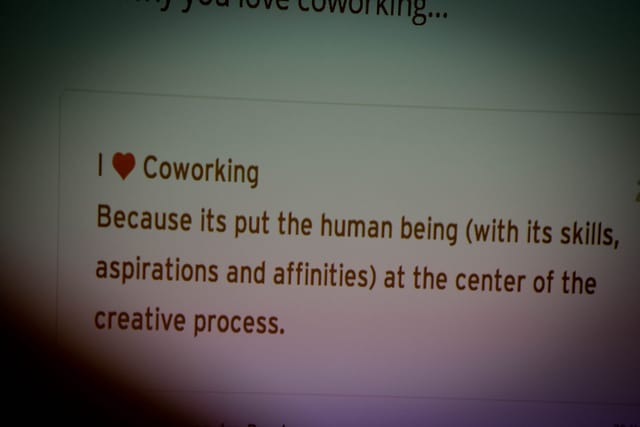What to write?
So every week I have to come up with a new idea about what to write.
And in the last few weeks, I’ve come up with ideas — non-stop.
It is too many ideas, but now I know which ones to use.
How to know what to write.
So I know what to write because I’m always talking to people and asking questions.
And like most things in life- the problem is never the problem.
If you look at Brené Brown’s original TEDx talk about The Power of Vulnerability, in which she says to her therapist — I just need some strategies, none of that family stuff.
She thinks she knows what she is doing.
And a lot of starting work with clients goes like this:
I was like, “Okay.”
So I found a therapist. My first meeting with her, Diana — I brought in my list of the way the whole-hearted lives, and I sat down.
And she said, “How are you?”
And I go, “I’m great. I’m okay.”
She says, “What’s going on?”
(And this is a therapist who sees therapists because we have to go to those because their B.S. meters are good. )
Brené then states — “Here’s the thing, I’m struggling.”
And Diana asks, “What’s the struggle?”
“Well, I have a vulnerability issue. And I know that vulnerability is the core of shame and fear and our struggle for worthiness, but it appears that it’s also the birthplace of joy, of creativity, of belonging, of love. And I think I have a problem, and I need some help.”
Then Brené follows with, “But here’s the thing: no family stuff, no childhood shit. I just need some strategies.”
Diana says “It just is what it is.”
Brené replies “Oh my God, this is going to suck.”
And it did, and then it didn’t. And it took about a year.
You think you know what you need
People, especially me, think they know about marketing their business.
They read all the books, the blogs, buys the online courses and quotes HubSpot and Seth Godin but never actually takes any action.
Look at this list of London Coworking Spaces to see who has their website in check.
One of the problems is that people only want to do marketing when they think it will sell something.
They are afraid to experiment because:
A. They’ll look silly — and who likes looking silly?
B. They’ll lose money — and who wants to lose money?
C. and most of all, it won’t work — who want to do stuff that does not work?
Experience is something you don’t have until just after you need it.
Doing the work
It is after you have sent emails, done calls and posted blogs and recorded podcasts that you will know.
This year, I’ve had the most consistent marketing and communications regime I’ve ever had in my life.
In this lockdown, I’ve hosted over 60 group calls for Coworking space owners, recorded 30 podcasts, sent around 100 email newsletters and I’m still working it out.
Was it the COVID air or is it just me?
I’m still working it out because a website is never finished; there is always a new story to find and share.
There is always a new question to answer and problems to solve.
Don’t go at it alone.
The thing I’ve picked up most on this year is asking for help.
There are so many good things to do and some I am 100
So my message for the blog this week is to keep making content!
People don’t care what you say they care what you publish. – Jammy Digital
For example, people would come to London bloggers meet up and say we’re thinking about our SEO and I’d ask what do you mean?
They’ll say they were looking for ways to write a post that would get them to rank and this is why they had come to the meetup.
So before they’d even made a website, they were tactical about SEO.
So If your website is about milkshakes and all your article headlines have the word “Cup Size” in the title you might attract a lot of ladies who are not looking for Mike Shake recipes.
At the beginning of most websites, this is all you need to think about.
Most of these people never get off the ground with their websites.
If you had opened a coworking space in London in 2012 and posted – https://howlongagogo.com/date/2012/september/1
You would have 419 blog posts on your site, and if they all had the words coworking and London, Hackney, Brixton or Camden in you would be ranking very high organically.
PLUS people would know who and what you care about.
The posts that bring the most traffic to my site were the ones about Trello from around 2015 when my mate Nil’s and I launched an online Trello course.
If only I’d written ones about marketing your independently owned UK based coworking space!
I’ve been learning and practising marketing non-stop since 2005 when organised the website for the event staffing agency I worked at.
Other than the ‘big companies’, we were one of the first with a website!
I just thought you need a website? Isn’t it?
I’d worked with Off To Work as it had started and Philip Atkins the founder, well he had a website, and I could book work through it, so why isn’t everyone doing this?
So really I just copied him.
Philip now has branches all over the UK, and because of Philip, I got to serve the Queen her Beef Wellington when Swindon’s new council offices were opened.
Since 2005 websites have got way more accessible.
Email newsletters and marketing have got more straightforward and more manageable.
DON’T OVERTHINK IT!
When you start, you need a super simple website and email list.
Corner Studio Brixton — is a small space with one owner and this website does the trick.
Mainyard — (where I’m based) Affordable Work-spaces Of All Shapes And Sizes For Small Businesses
Platform 9 — I’ve been following Seb and Jo from the beginning and they’ve always been plugged in the the local area on the their site.
The Skiff — Jon and Anna are slowly enabling the members of the Skiff to own it, I’ve always loved the vibe of this site.
The Arc Club — Bill themselves as a ‘neighbourhood workspace’ and they are, the Q4 cohort of the Urban MBA program will run from here.
The Melting Pot – Is one of the oldest coworking spaces in the UK and as Scotland’s centre for Social Innovation always has a lot going on.
These places all capture the character of the people there and the place.
You have to be realistic about who much time you have to give, but if you are the leader in the business, I always think it pays to write something regularly.
If you think your post on your website is equivalent to Michelle Obama doing her podcast, you’re missing the point.
Someone who I’ve known for years who always leads from the front is hilarious and has a long-standing business is Helena who runs Sister Snog, a long-running women’s networking organisation.
She shares without a big head and just enough glitter to be a princess.
Posting an update every week by email and blog could become the lifeblood of your community.
HOW DO I POST?
I’ve looked a couple of examples, Jonathan Stark sends a very fucking useful email every day.
When I asked him in awe how he does this, he said, when you commit to posting every day, you just wake up to what is going on around you.
You notice more and can spin it better, then you gather ideas in a folder and then before you know it you never run out of ideas.
How often
The more you post there, the more committed your following, people who don’t want an email every day don’t follow you.
When you post once every two months, and it is hey we have an event, want to buy a ticket?
People have no idea who you are.
I’ve been sending an email on and off for over a decade and when I send it every week amazing things happen.
I don’t mean I get hired for a million quid every week,
I tell people to ask me to do things or recommend me, I’ve very rarely sold anything in that email, but people have hired me all over.
Talking of regular posting I’ve been recording a podcast which we’ll launch early October and it will fire out twice a week.
It is people from all over my network offering specific tips on how to market your coworking space the simple way.

